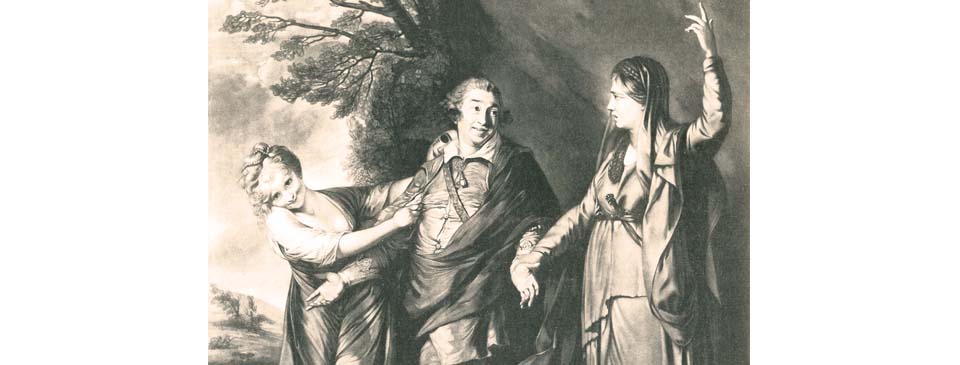David Garrick – master of tragedy and comedy

David Garrick stands between Comedy and Tragedy. The original portrait was painted by Joshua Reynolds in 1760-61 and exhibited at the Society of Artists in 1762, Reynolds’s first to be shown that was not a straight portrait. That same year this mezzotint version was published by Edward Fisher at the Golden Head, Leicester Square. Reynolds has captured Garrick’s ability to switch from tragic and comic roles.
David Garrick, actor, playwright, producer and manager of the Theatre Royal, Drury Lane was one of the most influential figures in the history of British theatre. During his long career he transformed and modernized the style of acting, production, methods of rehearsal, and even the attitude of audiences, which had previously been rather unruly. Plays changed from being a succession of speeches, with new styles of characterization and acting methods we would recognize today. Improvements were also made to lighting and scenery. Unusually he was an actor who was able to bring a business-sense to theatre management, gained by his early career in the wine trade.
One of the earliest ‘superstars’ of the entertainment world, Garrick’s talent earned him fame, fortune, respect and the ability to mix with the highest levels of society, which was unusual prior to the 20th century for a person who was neither of aristocratic birth nor a politician.
Garrick had a natural flair for acting, which began from childhood as the gift of mimicry. Unlike many of his contemporary actors he was a master of both comedy and tragedy, well-educated, extremely eloquent, and with a capacity for self-analysis that was rare in other actors of the time.
In the century and a half after Shakespeare’s death authentic versions of his plays had been all but forgotten but Garrick returned them to the stage, with adaptations that were closer to the originals, triumphantly taking lead roles for himself as major characters such as Richard III and Hamlet. He also revived works from the Restoration period, with updated versions suitable for the Georgian audience.
Garrick’s grandfather, David Garric, was a Huguenot Protestant and wine merchant of Bordeaux during the mid-17th century, himself the son of a successful wine trader, who fled to London in 1685. He soon rebuilt his wine business, took British nationality and anglicized his name to Garrick. His son Peter moved to the garrison town of Lichfield as a recruiting officer and that was where his family lived when his son, the future actor, was born.
Young David, an amusing boy who developed a talent for mimicry, visited the local bookseller, Michael Johnson, on an almost daily basis. Johnson’s son, Samuel, eight years older than David, was to become such a great influence on him during his life. Both David and Samuel were pupils at Lichfield Grammar School, which was strong in the classics. The two were the opposite in many ways, with quite different personalities, but also separated by age and generational outlooks, one becoming an old Tory and the other a Whig-style man of the 18th century. In their adult lives they were to move in different artistic worlds but remained constant companions, both tracing their roots to genteel poverty in Lichfield.
Even at a young age David became interested in the stage and both he and Samuel had the advantage of seeing touring companies perform at the Guildhall in Lichfield. He began to learn lines from plays with which he would entertain friends and relatives and in 1727, at the age of only ten, organised a performance of George Farquhar’s popular The Recruiting Officer in the great hall of the bishop’s palace, casting his friends, designing sets and choosing costumes. Garrick cast himself in the leading role and the play was a great success.
Samuel Johnson, seeking some form of income, set up a school close to Lichfield in 1736. It began with five pupils including David and George Garrick. David was by then nineteen and took very little interest in the work set for him by Johnson, spending much of his time writing comedy plays.
It was decided that David should study at the Inns of Court in London, but initially to prepare at a school in Rochester. Samuel Johnson’s school had not proved a success so he was contemplating moving to London to find employment as a writer or translator, and also to attempt to have his play Irene staged there.
Garrick and Johnson, neither of whom had any money, decided to make the 120-mile journey to London together, in March 1737. They could only afford one horse so took turns to ride. With little money they had to borrow five pounds as soon as they arrived in order to afford food and shelter.
Garrick continued on to the school at Rochester. In the meantime, his father died and the family were left without an income. The only solution was for him to give up his studies and for him and his elder brother Peter use family connections to make their way in the wine trade. David set up the London end of the business, based close to the Strand.
Garrick easily fitted into London society. While not working he spent his free time around the nearby Covent Garden area, which in those days was the equivalent to Soho in the 20th century, with coffee-houses, theatres and the market. It was not difficult for him to make friends with actors and playwrights who frequented the Bedford coffee-house, thereby gaining admittance to the backstage areas of the theatres. By attending performances of many plays he was able to understand acting techniques and styles and the workings of the profession. Garrick also started to write critical reviews of plays, which appeared in the press. However, he also had a business to run and had continuous friction with his brother due to the amount of time he spent at the theatres.


